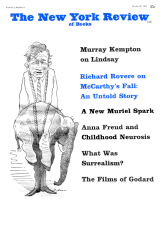In response to:
Letters: The Strange Case of Nabokov and Wilson from the August 26, 1965 issue
To the Editors:
I hope the tug-of-war between Mr. Wilson and Mr. Nabokov over Pushkin’s Eugene Onegin won’t distract our attention from the original. The strength of Mr. Wilson’s review, I thought, was that it directed our attention to Pushkin’s “novel in verse.” I find it symptomatic that Mr. Nabokov, with professorial preciosity, is haggling over Mr. Wilson’s knowledge of Russian (which is impressive) and trying to deflect attention from his own knowledge of English (which, alas, is not good enough). For example, Mr. Nabokov wants to insist that pochuya (v) is a perfective form to be translated as upon sensing. The point is not what form it is but what it means. Despite the grammars, perfective verbs in Russian may denote present tense and, the point here, despite what Mr. Nabokov says, present participles in English may convey perfective meanings. We simply say getting wind of and go on reading the rest of a major literary work.
Mr. Nabokov has been indecently unkind to Mr. Arndt; he has been misanthropically condescending to Russian scholars (whose work he mined for his own); and now he is supercilious toward Mr. Wilson, who said honestly and brightly that Pushkin deserved a better English translation than Mr. Nabokov offered. Mr. Wilson is dead right.
F. D. Reeve
Middletown, Connecticut
This Issue
October 28, 1965



